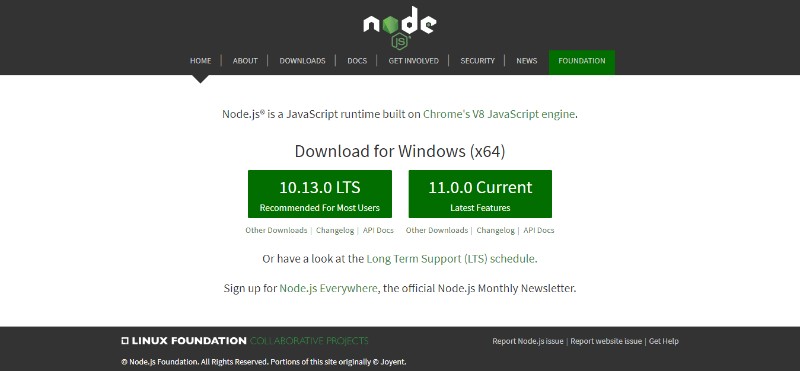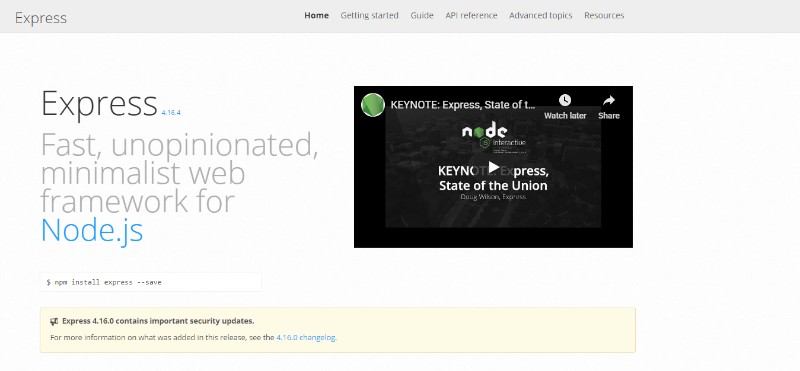Node.js Interview Questions You’ll Need to Answer

If you want to be the top-notch full-stack developer, being proficient in Node.js is a must. With that in mind, there are some Node js interview questions that you should know the answers to even in your sleep.
But let’s start at the beginning.
First of all, why would you even care about Node.js interview questions? Well, let’s just say that if you want to score the best developer job, you need to be well-prepared for all JavaScript tricky interview questions. After all, it will all pay off once you get the job of your dreams.
So let’s take a look at some common Node interview questions to help you prepare for your upcoming interview.
Q. What is Node.js? Where can you use it?

A. This is definitely the first among the Node js interview questions.
Node.js is a tool that will help you build scalable web applications and other programs. It is a server-side scripting based on JavaScript and it is especially useful for building apps that are computationally simple but frequently accessed.
With that in mind, Node.js is commonly used for building I/O sensitive web apps, for example, streaming sites. It also comes in handy for creating real-time apps, network web applications, general-purpose apps, and distributed systems.
Q. Why should you use Node.js?
A. One should use Node.js when they want to easily build scalable apps. The biggest pros include:
– It is very fast in code execution
– It is asynchronous and event-driven
– It is single-threaded but highly scalable
– No buffering
Q. What are the features of Node.js?
A. Node.js is a system built on Google Chrome’s V8 JavaScript Engine which makes it very fast. Since the APIs of Node.js library are asynchronous, they are non-blocking which means that a Node.js based server never waits for an API to return data.
This system uses a single threaded model with event looping. With the event mechanism helping the server respond in a non-blocking way, the server is highly scalable compared to the other servers that create limited threads to handle requests.
Q. Why is Node.js Single-threaded?
A. The single-threaded model is used for async processing. It results in higher performance and better scalability compared to the typical thread-based implementation.
Q. Explain callback in Node.js.
A. At the completion of a task, a callback function is called to allow other code to be run in the meantime with no blocking. The callback is particularly important for asynchronous platforms such as Node.js and all Node’s APIs are written to support it.
Q. Explain the role of REPL in Node.js.
A. REPL stands for Read, Evaluate, Print, Loop – and it performs all the mentioned tasks accordingly. It is used to execute ad-hoc JavaScript statements and it is a very important part of the testing and debugging process.
Q. What is the difference between Asynchronous and Non-blocking?
A. This is one of the JavaScript technical interview questions that you should knot the answer to.
Asynchronous or simply not synchronous means that the HTTP requests are not waiting for the server response. You can continue with other block and respond to the server response when received.
Non-Blocking, on the other hand, is a term commonly used with IO. For instance, non-blocking read/write calls return and expect the caller to call again. Read will wait until it has some data and put calling thread to sleep.
Q. What is package.json? What is it used for?
A. Package.json holds various metadata information about the project. The information contained in this file is then given to npm to identify the project and to handle its dependencies.
Some of the fields are name, description, author, and dependencies.
The dependencies are then installed whenever the project is installed through npm. Moreover, if the npm install is run in the root directory of the project, the dependencies will be installed in ./node_modules directory.
Q. What is libuv?
A. Libuv is a multi-platform support library with a focus on asynchronous I/O. Although it was primarily developed for Node.js, it’s also commonly used by other systems such as Luvit, Julia, pyuv etc.
Back in the days when the whole Node project started, it was using Google’s V8 and Marc Lehmann’s libev. However, the problem with libev was that it ran only on Unix so they had to come up with the new solution to make it work on Windows, especially once node.js grew in popularity.
Libuv was an abstraction around libev or IOCP depending on the platform, providing users an API based on libev. In the node-v0.9.0 version of libuv, libev was removed.
Here are some of the key features:
- Full-featured event loop backed by epoll, kqueue, IOCP, event ports.
- Asynchronous TCP and UDP sockets
- Asynchronous file and file system operations
- Child processes
- File system events
Q. What are some of the most popular modules of Node.js?
A. Interview questions on Node js often include popular Node’s modules. Let’s take here are some of them:
– xpress
– async
– browserify
– socket.io
– bower
– gulp
– grunt
Q. What is the difference between readFile vs createReadStream in Node.js?
A. readFile reads the entire contents of a file into memory before making it available to the User. readFileSync is a synchronous version of readFile.
createReadStream reads the file in chunks of the default size 64 kb.
Q. Explain child processes in Node
A. We can access operating system functionaries with the child processes. They are very important for scalability and you can use them to run system commands, read large files without blocking event loop, decompose the application into various nodes etc.
Q. Can we send/receive messages between child processes?
A. Yes, we can. We can use send() function to send a message to workers and receive the response on process.on(‘message’)event.
Q. Explain the file system module of Node
A. The file system module performs a file-related operation. It comprises synchronous and asynchronous functions to read/write files. For instance, readFile() function is asynchronous function to read file content from specified path and readFileSync() is synchronous function to read files.
Q. How to scale Node application?
A. There are two ways to scale a Node application:
– Cloning using the cluster module.
– Decomposing the application into smaller services – i.e microservices.
Q. List down your favorite and most useful NPM library
A. There is not one of node js interview questions and answers for experienced with only 1 correct answer. In fact, with Node js interview questions of this sort, you should answer according to your preference. Simply name your favorite NPM library and explain why you prefer it over the others.
Q. How to deploy Node application?
A. When answering Node js questions, you should know how to deploy Node app on several cloud providers. You should be familiar with the basics, including SSH access, git cloning, and running the application in process manager. Once you know all of that, you will be able to deploy the app on various cloud providers.
Q. What is tracing?
A. This is one of the basic Node js interview questions and answers. You should know that the purpose of tracing is to trace information generated by V8. To enable it, pass flag-trace-events-enabled when starting the node.
All recorded categories can be specified by the flag–trace-event categories. The enabled logs can be opened as chrome://tracing in Chrome.
Q. How to avoid Callback Hell?
A. Since Node.js uses single thread only, it happens that it leads to numerous queued events. And that is where the callback comes in.
Basically, every time a long-running query finishes its execution, the callback associated with the query is run. There are 4 common solutions for this issue:
- Modular code – the code split into smaller modules that are later joined together to the main module again
- Promise mechanism – ensures either a result or error; it’s an alternative way for the async code and it takes two optional arguments, one of which is called depending on the state of promise
- Use of generators – they wait and resume using the yield keyword but can also suspend and resume async operations.
- Async mechanism – the module with <async.waterfall> API which passes data from one operation to another using the next callback.
Q. Explain EventEmitter in Node.js?
A. This is a common Node js interview question. You should know that EventMitter class for event module helps with raising and handling custom events. You can access it with the following code:
// Import events module
var events = require(‘events’);
// Create an eventEmitter object
var eventEmitter = new events.EventEmitter();
Q. What is NPM?

A. This is another common interview question on Node.js and you should start by saying that NPM stands for Node Package Manager. It has 2 important functions:
It works on Online Repository for node.ls packages which are present at <nodejs.org>. In addition to that, it also works as a command line utility and does version management.
You can verify version using below command: npm –version.
To install any module you can use: npm install <Module Name>
Q. Explain the use of method spawn() and fork()?
A. The spawn method is used when a new process is to be launched with a given set of commands. Check out the following command:
child_process.spawn(command[, args][, options])
The fork method is considered to be a special case for spawn() method. The following code shows how to use it:
child_process.fork(modulePath[, args][, options])
Q. Explain control flow function and steps to execute it?
A. The control flow function is the code that runs between asynchronous function calls. Following steps should be followed to execute it:
1. Control the order of execution.
2. Collect data.
3. Limit concurrency.
4. Call the next step in the program.
Q. What are the two arguments that async.queue takes?
A. These two arguments are:
a) Task function
b) Concurrency value
Q. What is an event loop in Node.js?
A. Even loop in Node.js is used to process external events and convert them into callback invocations.
Q. Mention the steps by which you can async in Node.js?
A. You can async Node.js by the following steps:
1. First class functions
2. Function composition
3. Callback Counters
4. Event loops
Q. What are the pros and cons of Node.js?
A. When preparing for the Node js interview questions, you need to be well aware of all Node’s pros and cons. Let’s take a look at the most important ones:
Pros:
– In the cases when your app doesn’t have any CPU intensive computation, you can build the whole thing in Javascript, including the basic database level. All you have to do is use JSON storage object DB like MongoDB.
– Crawlers receive a full-rendered HTML response which is great for SEO.
Cons:
– Nnode.js responsiveness is blocked by an intensive CPU computation so a threaded platform would a better approach in those cases.
– Using a relational database with Node.js is considered less favorable
Q. How Node.js overcomes the problem of blocking of I/O operations?
A. By putting the event-based model at its core and using an event loop instead of threads, Node.js overcomes the problem of blocking I/O operations.
Q. What is the difference between Node.js vs Ajax?
A. This could be one of the JavaScript interview questions for 3 years experienced but, luckily, we are here to help with all those technical questions with answers.
The easiest way of describing the difference between Node.js and Ajax is by saying that Node is a server-side JavaScript, while Ajax is a client-side technology. What that means is that Ajax is often used for updating the contents of the page without refreshing it. Node, on the other hand, is used for developing server software, executed by the server rather than in the browser.
Q. What are the Challenges with Node.js?
A. Naming the challenges with Node.js is another of the common Node js interview questions. Technically speaking, it can be a bit challenging to have one process with one thread to scale up on multi-core server in Node.js.
Q. What does non-blocking mean in Node.js?
A. When we talk about non-blocking in Node.js, we are talking about the non-blocking I/O. We earlier explained how Node uses libuv to handle its IO in a platform-agnostic way. Long story short, a non-blocking request is made and upon a request, it queues it within the event loop. The JavaScript callback is then called on the main JavaScript thread.
Q. What is the command used for importing external libraries?
A. Command require is used for importing external libraries. For instance, “var http=require (“HTTP”)”. This will load the HTTP library and the single exported object through the HTTP variable.
Q. Which framework is most commonly used in Node.js?

A. The most common framework used in Node.js is Express.
Q. What is the use of Timers is Node.js?
A. Much like the name suggests, the Timer module executes code after a set period of time. It doesn’t need to be imported via require(). All the methods are available globally to emulate the browser JavaScript API which provides several ways of scheduling code to execute at a certain time.
The functions provided by Node.js Timers are setTimeout(), setImmediate(), and setInterval.
Q. What is the use of DNS module in Node.js?
A. This is also one of the common Node js interview questions and one should know that the DNS module consists of an asynchronous network wrapper. Now let’s take a look at the most commonly used functions of this module:
1. DNS.lookup(address, options, callback) – This method takes any website’s address as its first parameter and returns the corresponding first IPV4 or IPV6 record. The options parameter can be an integer or object. If no options are provided both IPV4 and IPV6 are valid inputs. The third parameter is the callback functions.
2. DNS.lookupservice(address, port, callback) – This function converts any physical address to an array of record types. The record types are specified by the second parameter, rrbyte. The third method is the callback function.
3. dns.getServers() – This function returns an array of IP address strings that are currently configured for DNS resolution, formatted according to rfc5952. A string will include a port section if a custom port is used.
4. DNS.setServers() – This function sets the IP address and port of servers to be used when performing DNS resolution. The DNS.setServers() method must not be called while a DNS query is in progress.
Ending thoughts on Node js interview questions
You should always start your preparation before waiting for the review of your resume and cover letter by the HR team, but when preparing for the Node js interview questions in particlular, start with the basics and move up from that. It is important to understand how things work in their core before moving on to the more complicated elements.
If you are looking to gain the best understanding possible of Node.js, you should have a basic understanding of other JavaScript-related systems and elements as well. It would be useful to learn more not only about Node.js itself but also about SAP module, list of SAP courses, Express js interview questions, interview questions for Angular js, benefits of six sigma certification etc.
If you enjoyed reading this article on Node.js interview questions, you should check out this one about Python vs PHP.
We also wrote about a few related subjects like Python interview questions, React interview questions, best IDE for web development, Python web development, Python frameworks and web developer interview questions.
